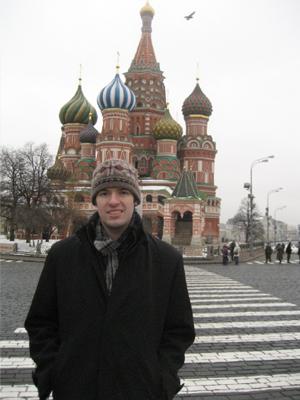Ghosts of Stalin: Ruins and Revival in Contemporary Sculpture and Architecture in Moscow

Andrew McKernan, a Russian and linguistics dual major and Honors Program student from Bow, NH, received an International Research Opportunities Program (IROP) grant to research contemporary sculpture and architecture in Moscow. He spent his junior year preparing for this by researching the architectural and artistic theories of 1930s Russia to understand why the Constructivism and Formalism movements gave way to the Palladian and Neo–Classical styles present in Stalinist architecture—a year which included one semester studying advanced Russian language in St. Petersburg.
"This project will focus on the dynamic between Soviet and contemporary society as exemplified by the relationship of Muscovites to the architecture and monuments of the 1930s," he explains. "While the most sought–after apartment listings include buildings in the Soviet Classicist style, iconic monuments lie disassembled. My research will explore this relationship by examining and analyzing examples of Soviet Classicism from their creation to the current day."
Andrew conducted much of his research at the Schusev State Museum of Architecture, as well as at the All–Russia Exhibition Centre and the Moscow Subway. Making use of his fluency in the Russian language, Andrew interviewed stakeholders in the current debates about destruction and construction of monuments and buildings with a Stalinist pedigree, persons including an architectural historian, the director of the Schusev Museum, real estate developers, and local citizens.
For this study, UNH history Professor Cathy Frierson served as Andrew's mentor. He presented his findings at the 2008 IROP symposium and published his research in Inquiry '09.
Andrew received a Fulbright scholarship for the 2009-2010 academic year to perform library and archival work at the Russian State Library and Shchusev State Museum of Architectural History, attend lectures at the Moscow Architectural Institute, and study the buildings constructed prior to Stalin’s death. In 2010 he will enter the Ph.D. program in Russian history at the University of Illinois at Urbana-Champaign.
